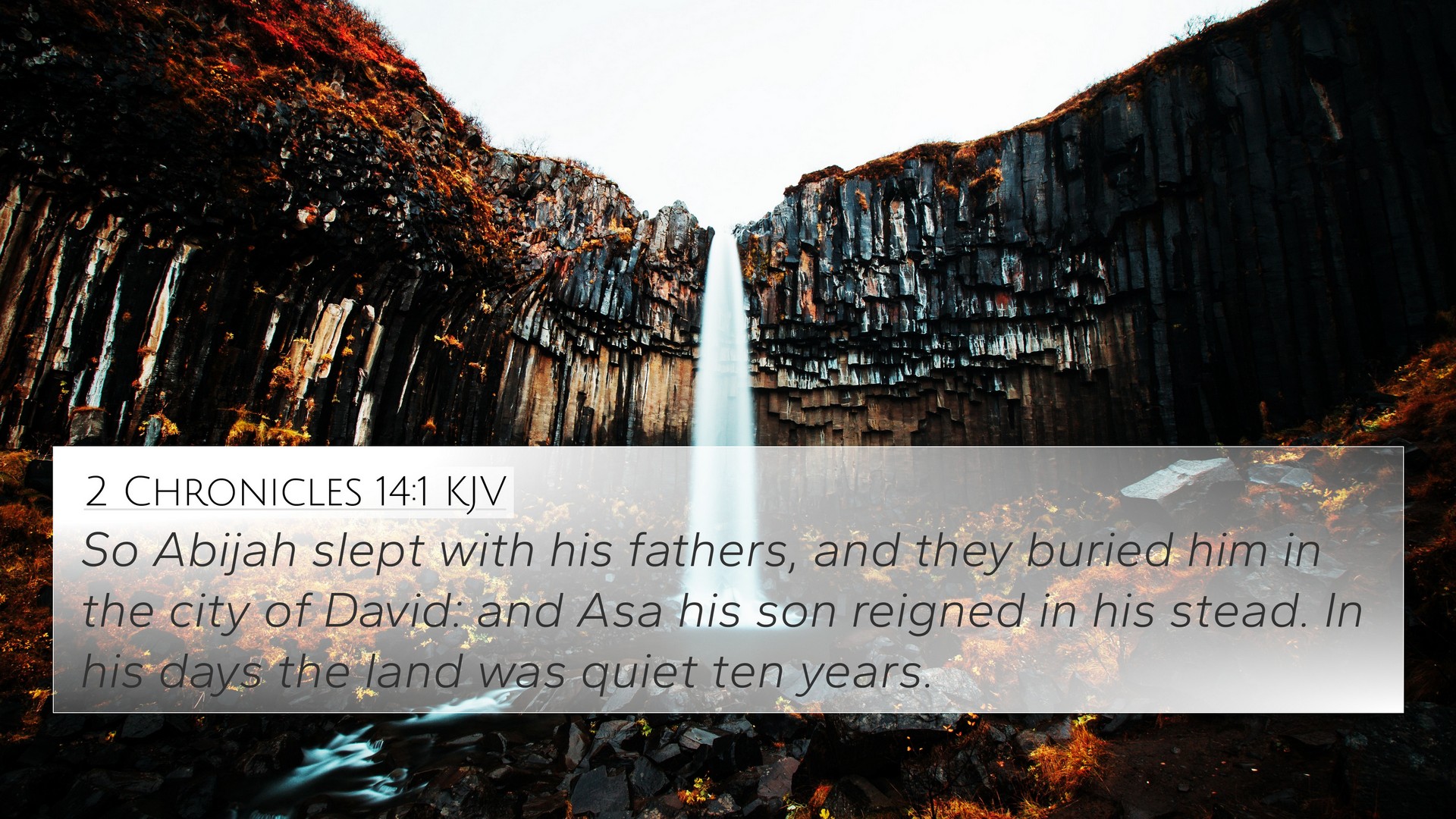Understanding 2 Chronicles 14:1
Verse: 2 Chronicles 14:1 - "So Abijah slept with his fathers, and they buried him in the city of David: and Asa his son reigned in his stead. In his days the land was quiet ten years."
Summary of Meaning: This verse marks a transitional moment in the history of Judah, as it introduces Asa, who was known for his religious reforms and efforts to strengthen the kingdom. The mention of peace during his reign suggests a period of stability that followed the tumultuous times of his predecessors.
Insights from Commentaries
-
Matthew Henry:
Henry emphasizes the significance of peaceful reign under Asa's leadership. He suggests that the quietness of the land indicates a lack of war and a time for spiritual renewal. Asa's reign is framed as an opportunity for the people to return to true worship.
-
Albert Barnes:
Barnes notes the contrast between Asa and Abijah, explaining how Asa’s reign marked a departure from the iniquities of his father. He connects this to the larger theme of God’s providential care for Judah, allowing a period of peace, which sets the stage for important reforms in worship and governance.
-
Adam Clarke:
Clarke points out the significance of Asa's ascension, suggesting that the peaceful decade provided him with the necessary conditions to implement reforms. He discusses Asa's role in restoring true worship, implying that the quiet period was a divine blessing enabling transformation.
Bible Verse Cross-References
This verse is rich in connections with many others throughout the Bible, enhancing its understanding through comparative Bible verse analysis. Here are some related verses:
- 1 Kings 15:9-15 - This passage details Asa's accomplishments and reforms in comparison to Abijah.
- 2 Chronicles 15:1-2 - Discusses the prophetic encouragement during Asa's reign, emphasizing the importance of seeking the Lord.
- 2 Chronicles 20:20 - Asserts the significance of faith in God during Asa's military campaigns, reinforcing the theme of trust leading to victory.
- 2 Chronicles 13:14-17 - Provides context on Abijah and the preceding conflicts, illuminating the transition to Asa’s peaceful reign.
- Psalm 133:1 - Highlights the beauty of unity; poignant as Asa sought to unify and strengthen the nation during his peaceful reign.
- Isaiah 26:3 - Offers insight into the peace that comes from steadfast trust in God, paralleling the tranquility during Asa’s time.
- 2 Timothy 2:12 - Explores themes of endurance and shared authority, key aspects of Asa's leadership style.
Thematic Connections
The verse and its related passages reveal numerous thematic Bible verse connections:
- Leadership and Legacy: Asa’s reign is viewed in light of his predecessor, and his reforms showcase the impact of a leader’s legacy on a nation.
- Peace and Divine Favor: The periods of tranquility often interpreted as God’s favor for the people’s return to Him.
- Worship Restoration: Asa’s actions underscore the importance of worshiping the true God versus the idolatry rampant in prior reigns.
- Divine Providence: Each event surrounding Asa’s reign speaks to God’s overarching plan for His people, seen throughout scriptural cross-referencing.
Using Bible Cross-References in Study
For those engaged in Bible cross-reference studies, this verse serves as a crucial anchor point:
- Utilize bible concordances to trace themes of leadership and divine favor.
- Employ a bible cross-reference guide to explore connections between leaders in Israel’s history.
- Engage in cross-reference bible study methods to deepen understanding of Asa's reforms.
- Implement bible reference resources to identify cross-references for sermon preparation.
Conclusion
Through careful analysis of 2 Chronicles 14:1 and its context, we see how biblical authors link various themes through the lives of their characters. The significance of Asa’s reign is deeply intertwined with the legacy of obedience and the pursuit of peace, a lesson vital for today’s believers. Understanding these connections strengthens our walks and enhances our comprehension of Scripture.








